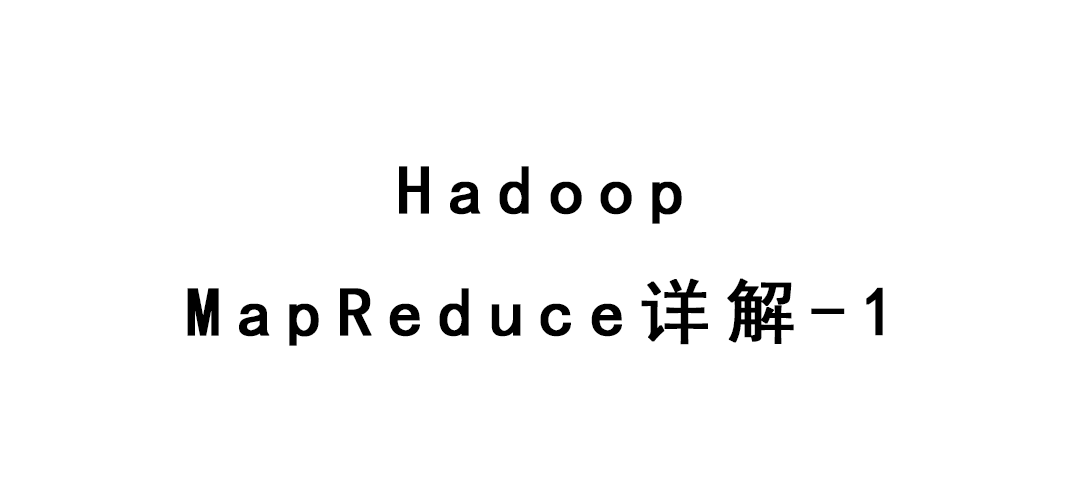
Hadoop-MapReduce详解-1
[TOC]
Hadoop-MapReduce详解-1
hdfs负责存储,mapreduce负责计算,yarn资源调度。
第1章 MapReduce概述
MapReduce定义
MapReduce是一个分布式运算程序的编程框架,是用户开发”基于Hadoop的数据分析应用”的核心框架。
MapReduce核心功能是将用户编写的业务逻辑代码和自带默认组件整合成一个完整的分布式运算程序,并发运行在一个Hadoop集群上。
MapReduce优缺点
优点
- MapReduce 易于编程
它简单的实现一些接口,就可以完成一个分布式程序,这个分布式程序可以分布到大量廉价的PC机器上运行。也就是说你写一个分布式程序,跟写一个简单的串行程序是一模一样的。 就是因为这个特点使得MapReduce编程变得非常流行。
- 良好的扩展性
当你的计算资源不能得到满足的时候,你可以通过简单的增加机器来扩展它的计算能力。
- 高容错性
MapReduce设计的初衷就是使程序能够部署在廉价的PC机器上,这就要求它具有很高的容错性。比如其中一台机器挂了,它可以把上面的计算任务转移到另外一个节点上运行,不至于这个任务运行失败,而且这个过程不需要人工参与,而完全是由Hadoop内部完成的。
- 适合PB级以上海量数据的离线处理
可以实现上干台服务器集群并发工作,提供数据处理能力。
缺点
- 不擅长实时计算
MapReduce无法像MySQL样,在毫秒或者秒级内返回结果。
- 不擅长流式计算
流式计算的输入数据是动态的,而MapReduce的输入数据集是静态的,不能动态变化。这是因为MapReduce自身的设计特点决定了数据源必须是静态的(日活、月活等)。
- 不擅长DAG (有向图)计算
多个应用程序存在依赖关系,后一个应用程序的输入为前一个的输出。在这种情况下,MapReduce并不是不能做,而是使用后,每个MapReduce作业的输出结果都会写入到磁盘,会造成大量的磁盘IO,导致性能非常的低下。
MapReduce核心思想
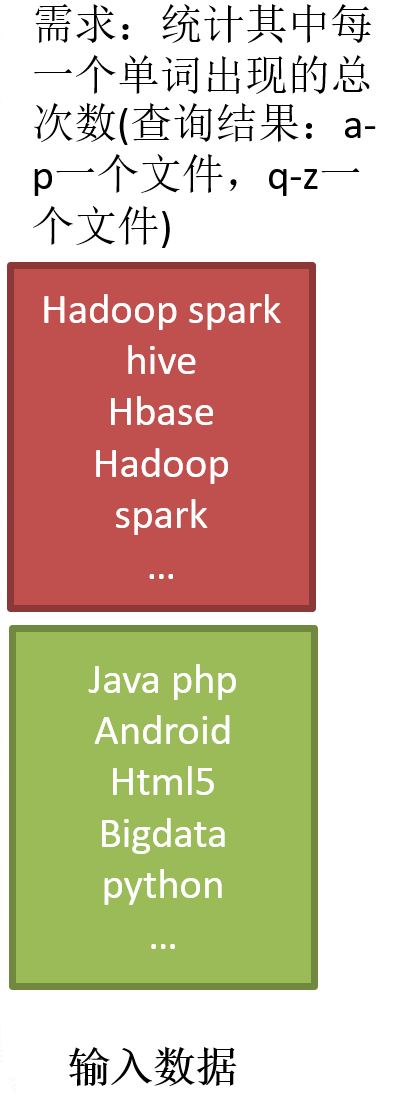
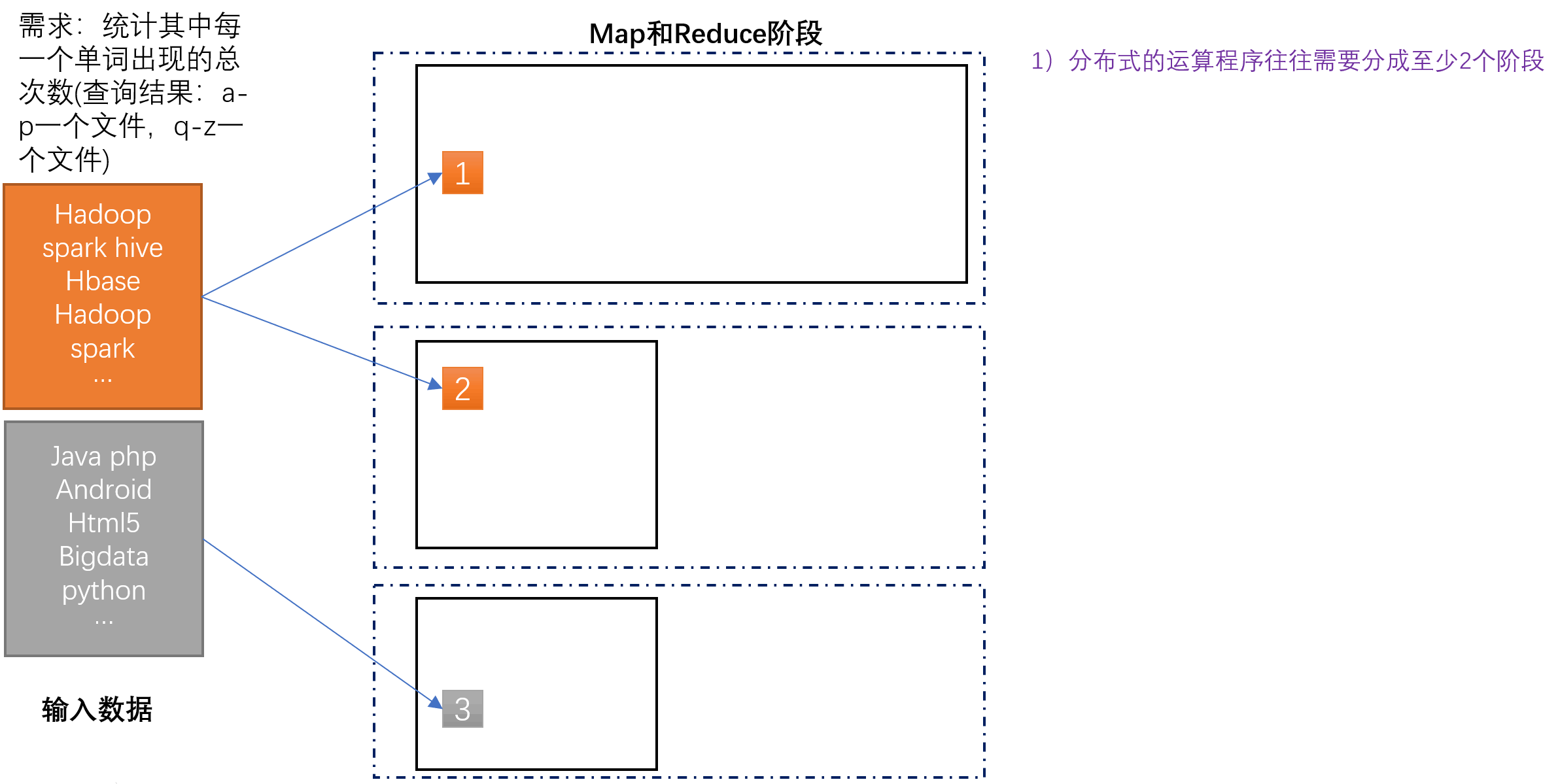
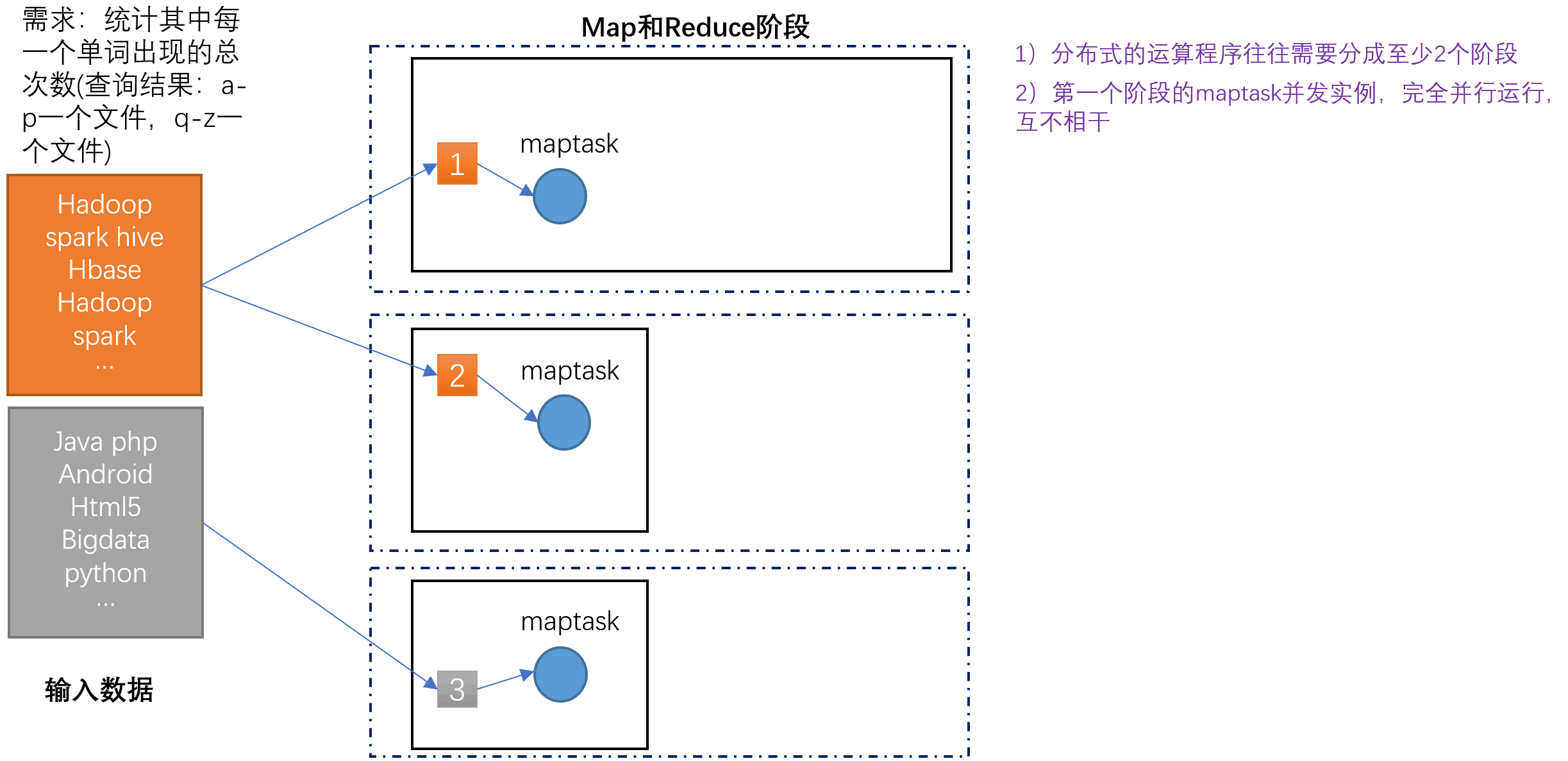
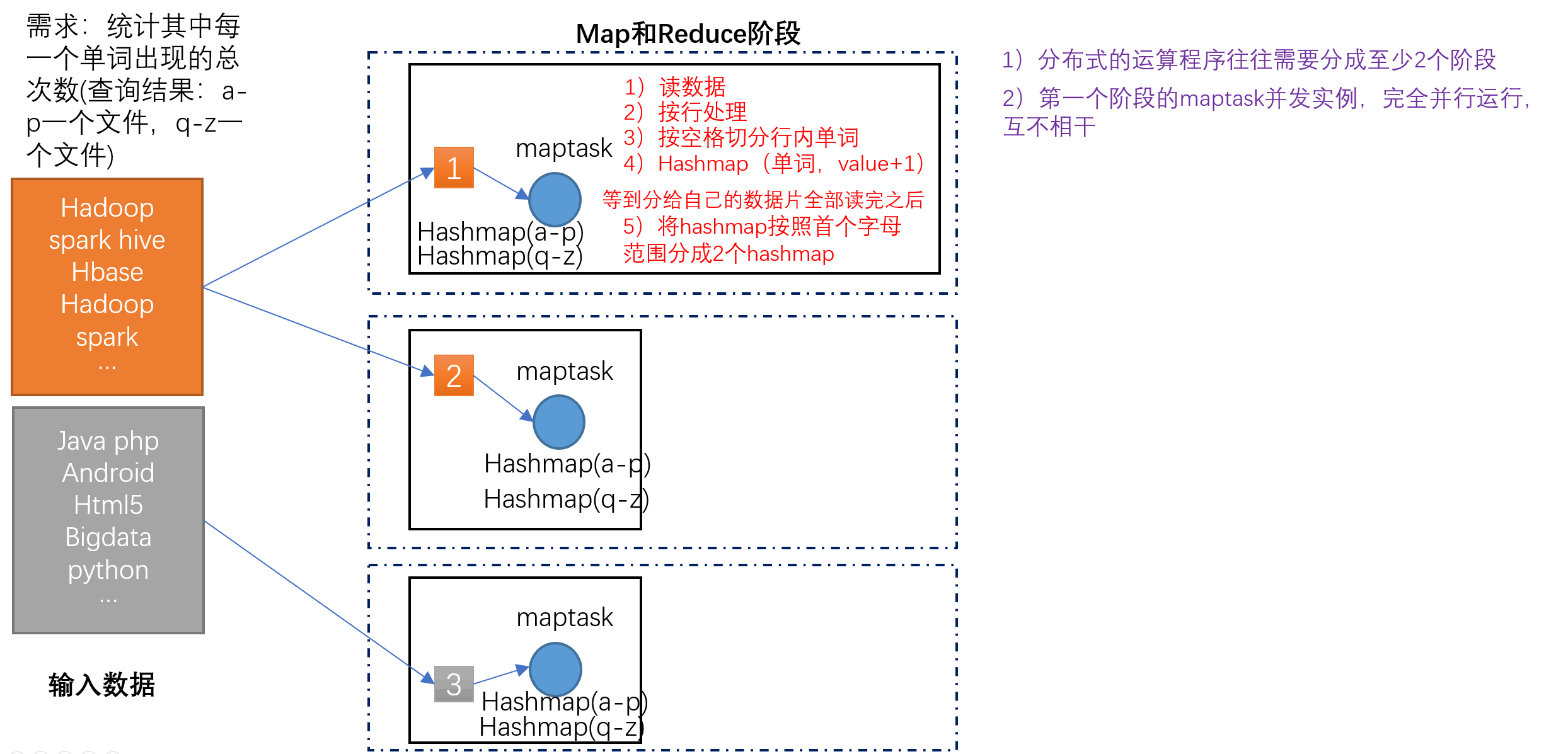
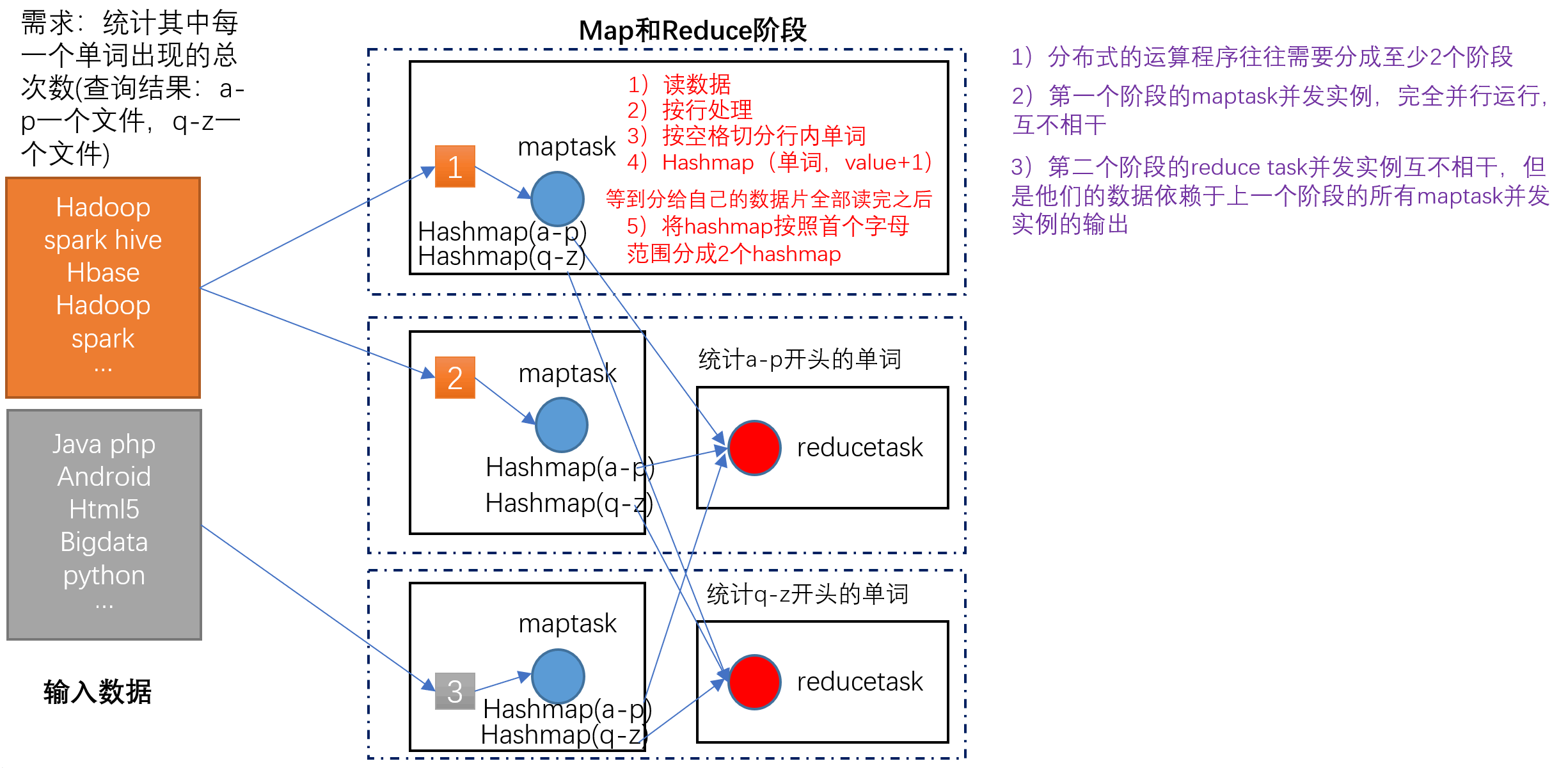
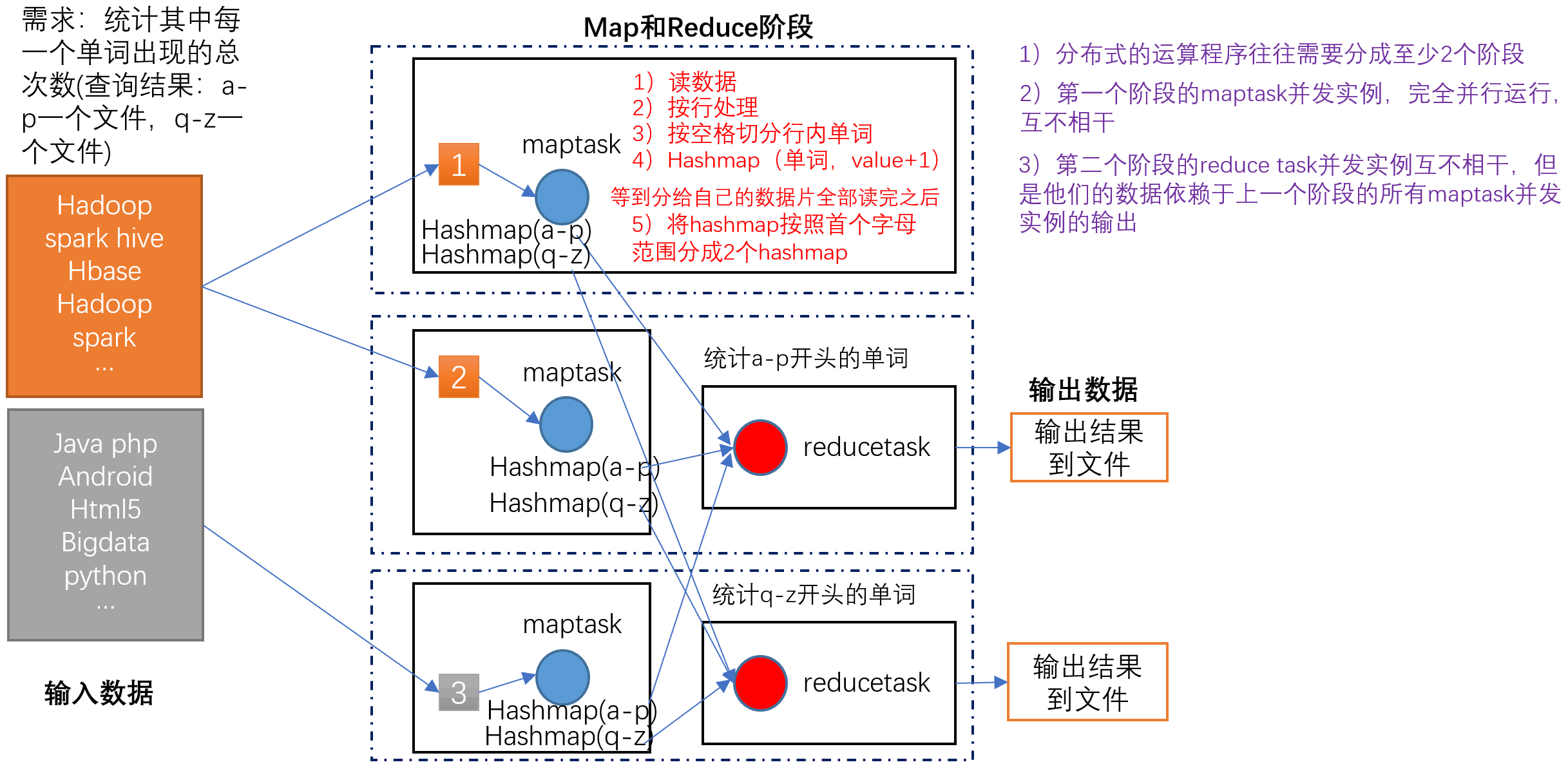
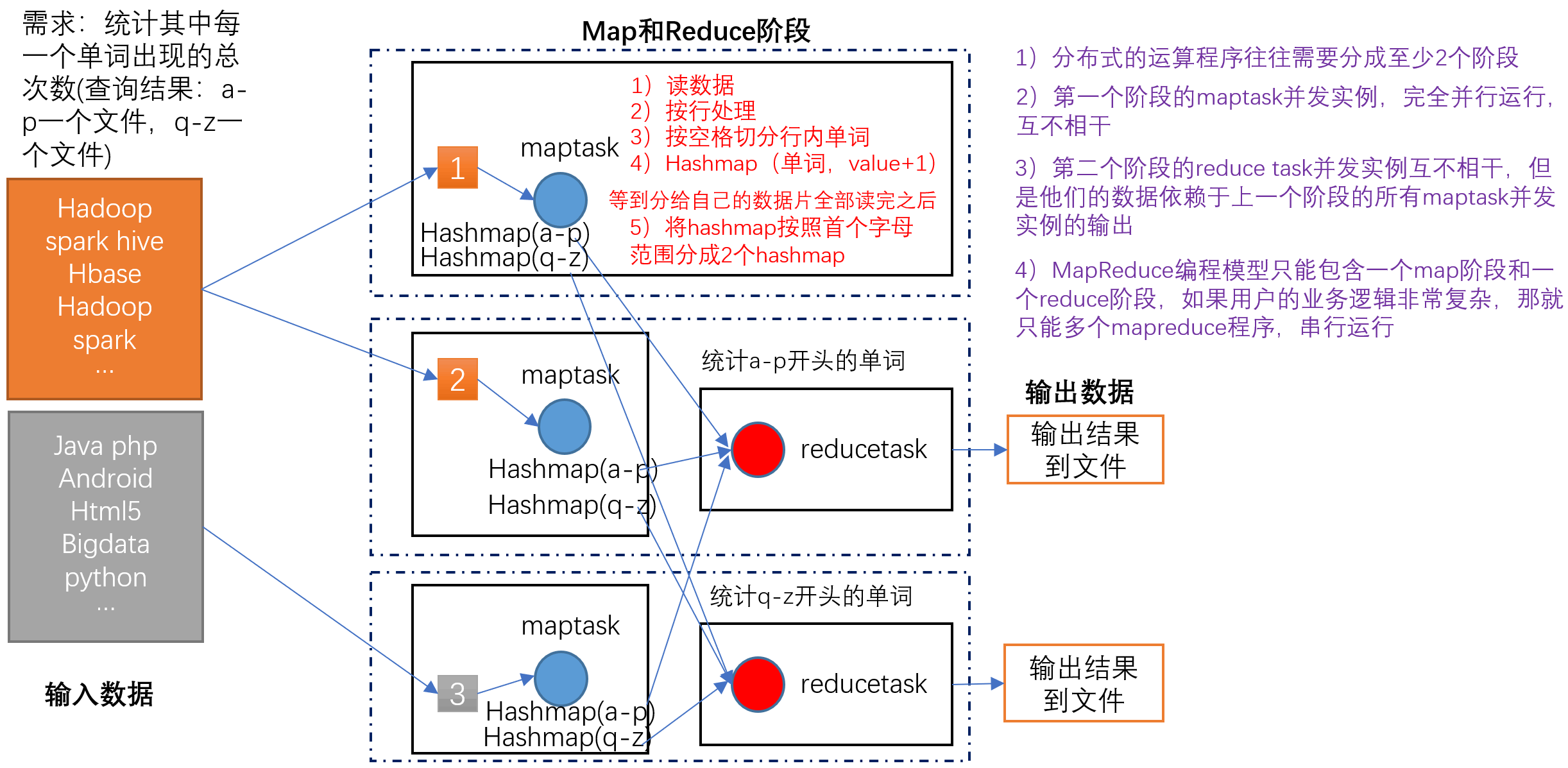
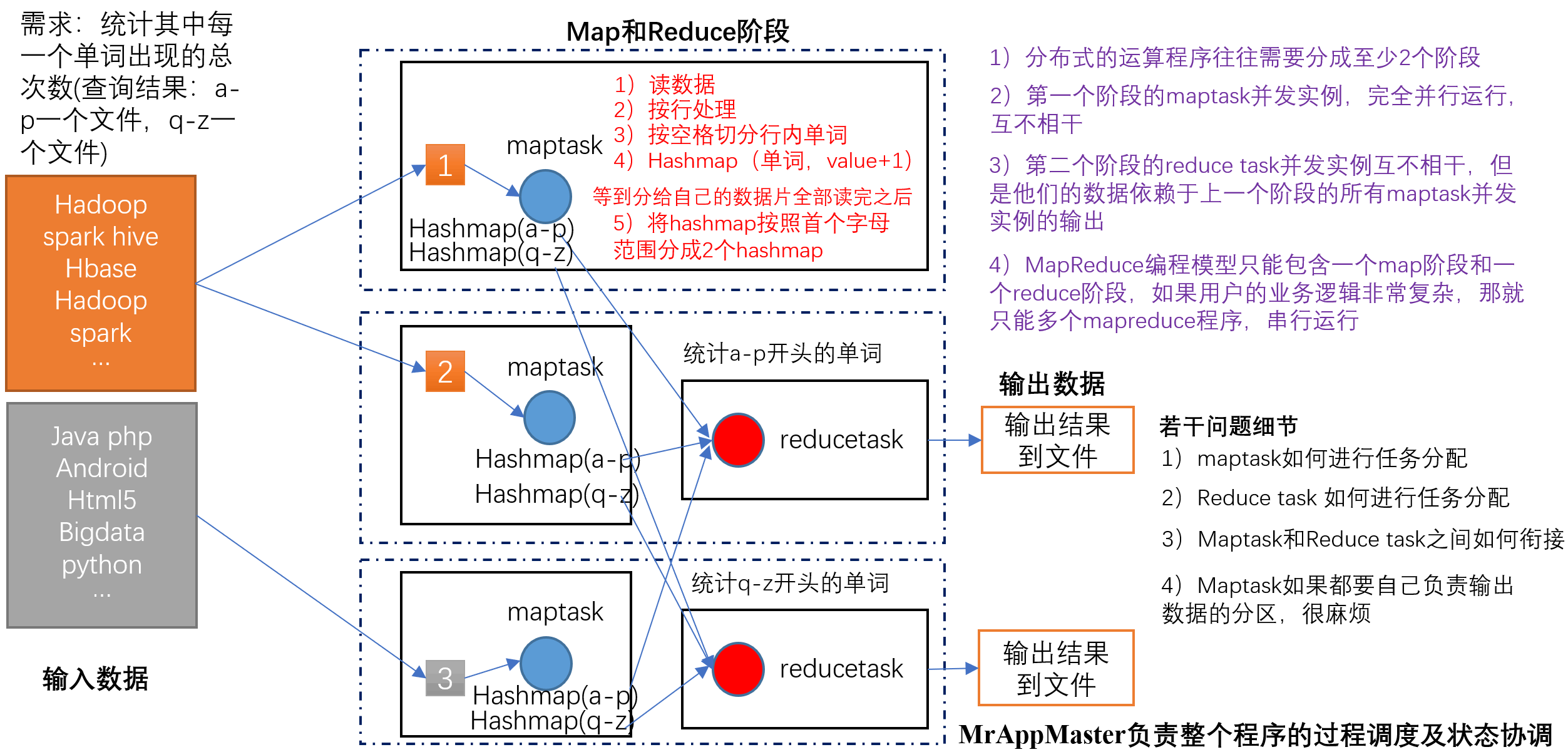
1)分布式的运算程序往往需要分成至少2个阶段。
2)第一个阶段的MapTask并发实例,完全并行运行,互不相干。
3)第二个阶段的ReduceTask并发实例互不相干,但是他们的数据依赖于上一个阶段的所有MapTask并发实例的输出。
4)MapReduce编程模型只能包含一个Map阶段和一个Reduce阶段,如果用户的业务逻辑非常复杂,那就只能多个MapReduce程序,串行运行。
总结:分析WordCount数据流走向深入理解MapReduce核心思想。
MapReduce进程
一个完整的MapReduce程序在分布式运行时有三类示例进程:
MrAppMaster
负责整个程序的过程调度及状态协调。(内存、cpu、开启map和reduce、job级别)
MapTask
负责Map阶段的整个数据处理流程。(分)
ReduceTask
负责Reduce阶段的整个数据处理流程。(合)
官方WordCount源码
采用反编译工具反编译源码,发现WordCount案例有Map类、Reduce类和驱动类。且数据的类型是Hadoop自身封装的序列化类型。
hadoop-2.7.2\share\hadoop\mapreduce\hadoop-mapreduce-examples-2.7.2.jar\org\apache\hadoop\examples\WordCount.class
1
2
3
4
5
6
7
8
9
10
11
12
13
14
15
16
17
18
19
20
21
22
23
24
25
26
27
28
29
30
31
32
33
34
35
36
37
38
39
40
41
42
43
44
45
46
47
48
49
50
51
52
53
54
55
56
57
58
59
60
61
62
63
64
65
66
67
68
69
70
71
72
73
74
75
| package org.apache.hadoop.examples;
import java.io.IOException;
import java.io.PrintStream;
import java.util.StringTokenizer;
import org.apache.hadoop.conf.Configuration;
import org.apache.hadoop.fs.Path;
import org.apache.hadoop.io.IntWritable;
import org.apache.hadoop.io.Text;
import org.apache.hadoop.mapreduce.Job;
import org.apache.hadoop.mapreduce.Mapper;
import org.apache.hadoop.mapreduce.Mapper.Context;
import org.apache.hadoop.mapreduce.Reducer;
import org.apache.hadoop.mapreduce.Reducer.Context;
import org.apache.hadoop.mapreduce.lib.input.FileInputFormat;
import org.apache.hadoop.mapreduce.lib.output.FileOutputFormat;
import org.apache.hadoop.util.GenericOptionsParser;
public class WordCount
{
public static void main(String[] args)
throws Exception
{
Configuration conf = new Configuration();
String[] otherArgs = new GenericOptionsParser(conf, args).getRemainingArgs();
if (otherArgs.length < 2) {
System.err.println("Usage: wordcount <in> [<in>...] <out>");
System.exit(2);
}
Job job = Job.getInstance(conf, "word count");
job.setJarByClass(WordCount.class);
job.setMapperClass(TokenizerMapper.class);
job.setCombinerClass(IntSumReducer.class);
job.setReducerClass(IntSumReducer.class);
job.setOutputKeyClass(Text.class);
job.setOutputValueClass(IntWritable.class);
for (int i = 0; i < otherArgs.length - 1; i++) {
FileInputFormat.addInputPath(job, new Path(otherArgs[i]));
}
FileOutputFormat.setOutputPath(job, new Path(otherArgs[(otherArgs.length - 1)]));
System.exit(job.waitForCompletion(true) ? 0 : 1);
}
public static class IntSumReducer extends Reducer<Text, IntWritable, Text, IntWritable>
{
private IntWritable result = new IntWritable();
public void reduce(Text key, Iterable<IntWritable> values, Reducer<Text, IntWritable, Text, IntWritable>.Context context)
throws IOException, InterruptedException
{
int sum = 0;
for (IntWritable val : values) {
sum += val.get();
}
this.result.set(sum);
context.write(key, this.result);
}
}
public static class TokenizerMapper extends Mapper<Object, Text, Text, IntWritable>
{
private static final IntWritable one = new IntWritable(1);
private Text word = new Text();
public void map(Object key, Text value, Mapper<Object, Text, Text, IntWritable>.Context context) throws IOException, InterruptedException
{
StringTokenizer itr = new StringTokenizer(value.toString());
while (itr.hasMoreTokens()) {
this.word.set(itr.nextToken());
context.write(this.word, one);
}
}
}
}
|
hadoop-2.7.2\share\hadoop\mapreduce\hadoop-mapreduce-examples-2.7.2.jar\org\apache\hadoop\examples\WordCount$IntSumReducer.class
1
2
3
4
5
6
7
8
9
10
11
12
13
14
15
16
17
18
19
20
21
22
23
| package org.apache.hadoop.examples;
import java.io.IOException;
import org.apache.hadoop.io.IntWritable;
import org.apache.hadoop.io.Text;
import org.apache.hadoop.mapreduce.Reducer;
import org.apache.hadoop.mapreduce.Reducer.Context;
public class WordCount$IntSumReducer extends Reducer<Text, IntWritable, Text, IntWritable>
{
private IntWritable result = new IntWritable();
public void reduce(Text key, Iterable<IntWritable> values, Reducer<Text, IntWritable, Text, IntWritable>.Context context)
throws IOException, InterruptedException
{
int sum = 0;
for (IntWritable val : values) {
sum += val.get();
}
this.result.set(sum);
context.write(key, this.result);
}
}
|
hadoop-2.7.2\share\hadoop\mapreduce\hadoop-mapreduce-examples-2.7.2.jar\org\apache\hadoop\examples\WordCount$TokenizerMapper.class
1
2
3
4
5
6
7
8
9
10
11
12
13
14
15
16
17
18
19
20
21
22
23
| package org.apache.hadoop.examples;
import java.io.IOException;
import java.util.StringTokenizer;
import org.apache.hadoop.io.IntWritable;
import org.apache.hadoop.io.Text;
import org.apache.hadoop.mapreduce.Mapper;
import org.apache.hadoop.mapreduce.Mapper.Context;
public class WordCount$TokenizerMapper extends Mapper<Object, Text, Text, IntWritable>
{
private static final IntWritable one = new IntWritable(1);
private Text word = new Text();
public void map(Object key, Text value, Mapper<Object, Text, Text, IntWritable>.Context context) throws IOException, InterruptedException
{
StringTokenizer itr = new StringTokenizer(value.toString());
while (itr.hasMoreTokens()) {
this.word.set(itr.nextToken());
context.write(this.word, one);
}
}
}
|
常用数据序列化类型
| Java类型 |
Hadoop Writable 类型 |
| boolean |
BooleanWritable |
| byte |
ByteWritable |
| int |
IntWritable |
| float |
FloatWritable |
| long |
LongWritable |
| double |
DoubleWritable |
| String |
Text |
| map |
MapWritable |
| array |
ArrayWritable |
MapReduce编程规范
用户编写的程序分成三个部分:Mapper、Reducer和Driver。
Mapper阶段
(1) 用户自定义的Mapper要继承自己的父类
(2) Mapper的输入数据是KV对的形式(KV的类型可自定义)
(3) Mapper中的业务逻辑写在map()方法中
(4) Mapper的输出数据是KV对的形式(KV的类型可自定义)
(5) map()方法(MapTask进程)对每一个调用一次
Reducer阶段
(1) 用户自定义的Reducer要继承自己的父类
(2) Reducer的输入数据类型对应Napper的输出数据类型,也是KV
(3) Reducer的业务逻辑写在reduce()方法中
(4) RedneTask进程对每一组相同的k的组调用一次reduce()方法
Driver阶段
相当于YARN集群的客户端,用于提交我们整个程序到YARN集群,提交的是封装了MapReduce程序相关运行参数的job对象。
WordCount案例实操
需求
在给定的文本文件中统计输出每一个单词出现的总次数
(1)输入数据
hello.txt
1
2
3
4
5
6
7
| atguigu atguigu
ss ss
cls cls
jiao
banzhang
xue
hadoop
|
(2)期望输出数据
1
2
3
4
5
6
7
| atguigu 2
banzhang 1
cls 2
hadoop 1
jiao 1
ss 2
xue 1
|
需求分析
按照MapReduce编程规范,分别编写Mapper,Reducer,Driver
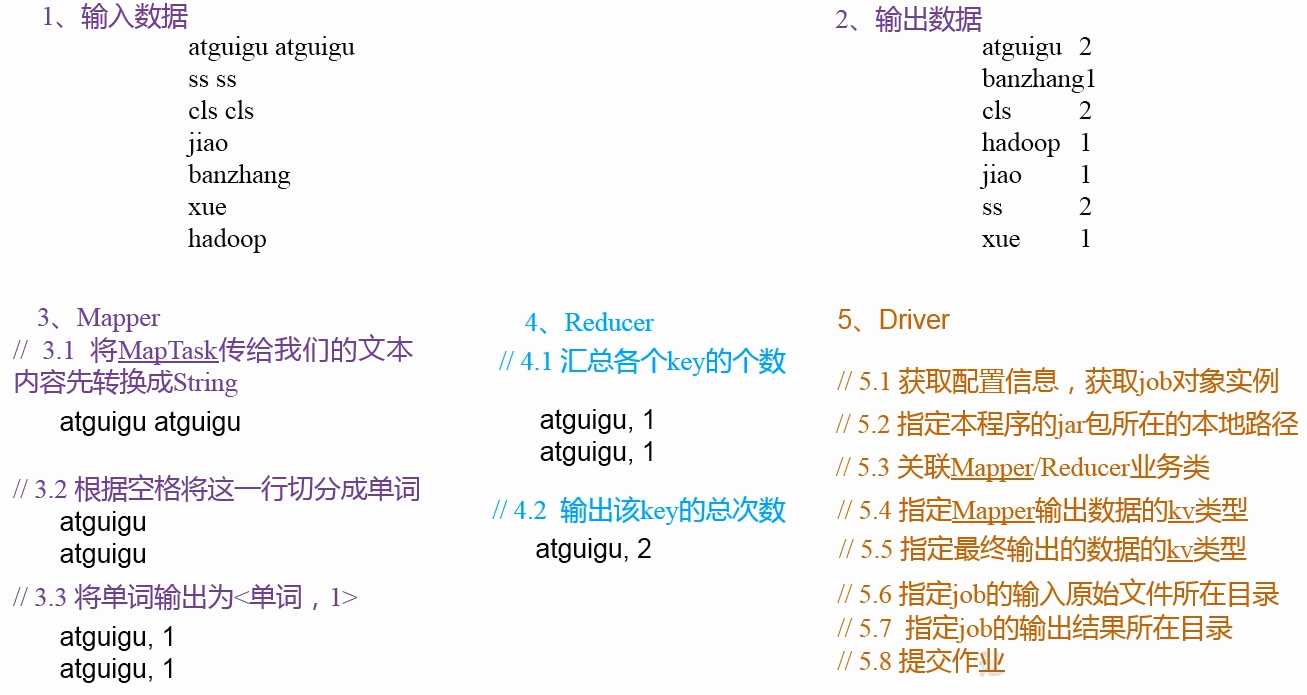
环境准备
(1)创建maven工程
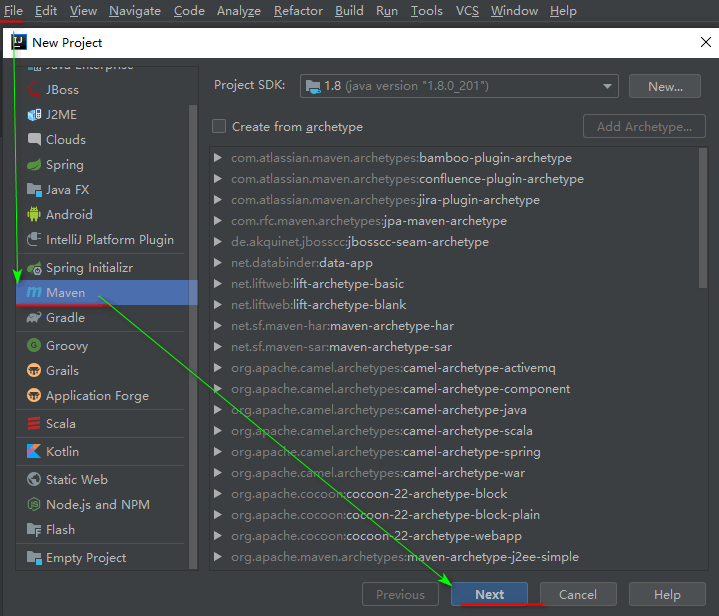
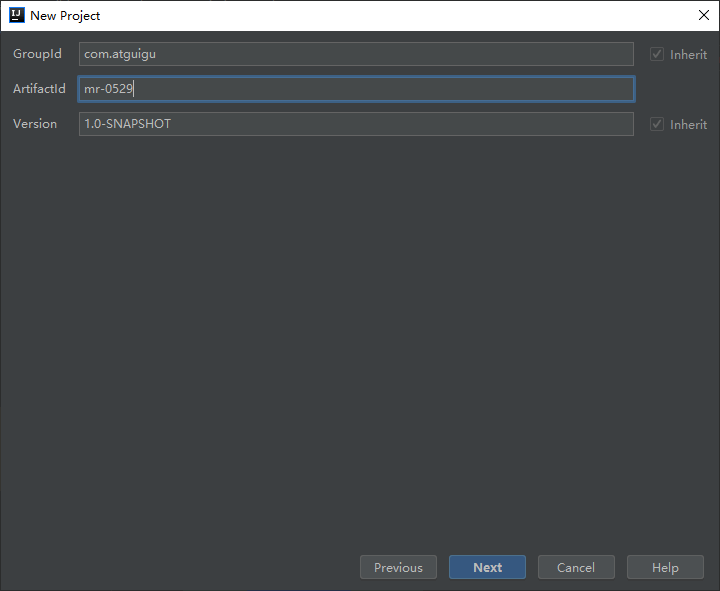
(2)在pom.xml文件中添加如下依赖
1
2
3
4
5
6
7
8
9
10
11
12
13
14
15
16
17
18
19
20
21
22
23
24
25
26
27
| <dependencies>
<dependency>
<groupId>junit</groupId>
<artifactId>junit</artifactId>
<version>RELEASE</version>
</dependency>
<dependency>
<groupId>org.apache.logging.log4j</groupId>
<artifactId>log4j-core</artifactId>
<version>2.8.2</version>
</dependency>
<dependency>
<groupId>org.apache.hadoop</groupId>
<artifactId>hadoop-common</artifactId>
<version>2.7.2</version>
</dependency>
<dependency>
<groupId>org.apache.hadoop</groupId>
<artifactId>hadoop-client</artifactId>
<version>2.7.2</version>
</dependency>
<dependency>
<groupId>org.apache.hadoop</groupId>
<artifactId>hadoop-hdfs</artifactId>
<version>2.7.2</version>
</dependency>
</dependencies>
|
(3)在项目的src/main/resources目录下,新建一个文件,命名为log4j.properties,在文件中填入。
1
2
3
4
5
6
7
8
| log4j.rootLogger=INFO, stdout
log4j.appender.stdout=org.apache.log4j.ConsoleAppender
log4j.appender.stdout.layout=org.apache.log4j.PatternLayout
log4j.appender.stdout.layout.ConversionPattern=%d %p [%c] - %m%n
log4j.appender.logfile=org.apache.log4j.FileAppender
log4j.appender.logfile.File=target/spring.log
log4j.appender.logfile.layout=org.apache.log4j.PatternLayout
log4j.appender.logfile.layout.ConversionPattern=%d %p [%c] - %m%n
|
(4)创建packagecom.atguigu.mr
编写程序
(1)编写Mapper类
查看Mapper父类
1
2
3
4
5
6
7
8
9
10
11
12
13
14
15
16
17
18
19
20
21
22
23
24
25
26
27
28
29
30
31
32
33
34
35
36
37
38
39
40
41
42
43
44
45
|
package org.apache.hadoop.mapreduce;
import java.io.IOException;
import org.apache.hadoop.classification.InterfaceAudience.Public;
import org.apache.hadoop.classification.InterfaceStability.Stable;
@Public
@Stable
public class Mapper<KEYIN, VALUEIN, KEYOUT, VALUEOUT> {
public Mapper() {
}
protected void setup(Mapper<KEYIN, VALUEIN, KEYOUT, VALUEOUT>.Context context) throws IOException, InterruptedException {
}
protected void map(KEYIN key, VALUEIN value, Mapper<KEYIN, VALUEIN, KEYOUT, VALUEOUT>.Context context) throws IOException, InterruptedException {
context.write(key, value);
}
protected void cleanup(Mapper<KEYIN, VALUEIN, KEYOUT, VALUEOUT>.Context context) throws IOException, InterruptedException {
}
public void run(Mapper<KEYIN, VALUEIN, KEYOUT, VALUEOUT>.Context context) throws IOException, InterruptedException {
this.setup(context);
try {
while(context.nextKeyValue()) {
this.map(context.getCurrentKey(), context.getCurrentValue(), context);
}
} finally {
this.cleanup(context);
}
}
public abstract class Context implements MapContext<KEYIN, VALUEIN, KEYOUT, VALUEOUT> {
public Context() {
}
}
}
|
编写WordcountMapper类
1
2
3
4
5
6
7
8
9
10
11
12
13
14
15
16
17
18
19
20
21
22
23
24
25
26
27
28
29
30
31
32
33
34
35
36
37
38
39
40
41
42
43
44
45
| package com.atguigu.mr.wordcount;
import org.apache.hadoop.io.IntWritable;
import org.apache.hadoop.io.LongWritable;
import org.apache.hadoop.io.Text;
import org.apache.hadoop.mapreduce.Mapper;
import java.io.IOException;
public class WordcountMapper extends Mapper<LongWritable, LongWritable, Text, IntWritable> {
Text k = new Text();
IntWritable v = new IntWritable(1);
@Override
protected void map(LongWritable key, LongWritable value, Context context) throws IOException, InterruptedException {
String line = value.toString();
String[] words = line.split(" ");
for (String word : words) {
k.set(word);
context.write(k, v);
}
}
}
|
(2)编写Reducer类
查看Reducer父类
1
2
3
4
5
6
7
8
9
10
11
12
13
14
15
16
17
18
19
20
21
22
23
24
25
26
27
28
29
30
31
32
33
34
35
36
37
38
39
40
41
42
43
44
45
46
47
48
49
50
51
52
53
54
55
56
57
58
59
|
package org.apache.hadoop.mapreduce;
import java.io.IOException;
import java.util.Iterator;
import org.apache.hadoop.classification.InterfaceAudience.Public;
import org.apache.hadoop.classification.InterfaceStability.Stable;
import org.apache.hadoop.mapreduce.ReduceContext.ValueIterator;
import org.apache.hadoop.mapreduce.task.annotation.Checkpointable;
@Checkpointable
@Public
@Stable
public class Reducer<KEYIN, VALUEIN, KEYOUT, VALUEOUT> {
public Reducer() {
}
protected void setup(Reducer<KEYIN, VALUEIN, KEYOUT, VALUEOUT>.Context context) throws IOException, InterruptedException {
}
protected void reduce(KEYIN key, Iterable<VALUEIN> values, Reducer<KEYIN, VALUEIN, KEYOUT, VALUEOUT>.Context context) throws IOException, InterruptedException {
Iterator var4 = values.iterator();
while(var4.hasNext()) {
VALUEIN value = var4.next();
context.write(key, value);
}
}
protected void cleanup(Reducer<KEYIN, VALUEIN, KEYOUT, VALUEOUT>.Context context) throws IOException, InterruptedException {
}
public void run(Reducer<KEYIN, VALUEIN, KEYOUT, VALUEOUT>.Context context) throws IOException, InterruptedException {
this.setup(context);
try {
while(context.nextKey()) {
this.reduce(context.getCurrentKey(), context.getValues(), context);
Iterator<VALUEIN> iter = context.getValues().iterator();
if (iter instanceof ValueIterator) {
((ValueIterator)iter).resetBackupStore();
}
}
} finally {
this.cleanup(context);
}
}
public abstract class Context implements ReduceContext<KEYIN, VALUEIN, KEYOUT, VALUEOUT> {
public Context() {
}
}
}
|
编写WordcountReducer类
1
2
3
4
5
6
7
8
9
10
11
12
13
14
15
16
17
18
19
20
21
22
23
24
25
26
27
28
29
30
31
32
33
34
35
36
37
| package com.atguigu.mr.wordcount;
import org.apache.hadoop.io.IntWritable;
import org.apache.hadoop.io.Text;
import org.apache.hadoop.mapreduce.Reducer;
import java.io.IOException;
import java.util.Iterator;
public class WordcountReducer extends Reducer<Text, IntWritable, Text, IntWritable> {
@Override
protected void reduce(Text key, Iterable<IntWritable> values, Context context) throws IOException, InterruptedException {
int sum = 0;
for (IntWritable value : values) {
sum += value.get();
}
context.write(key,new IntWritable(sum));
}
}
|
(3)编写Driver驱动类
1
2
3
4
5
6
7
8
9
10
11
12
13
14
15
16
17
18
19
20
21
22
23
24
25
26
27
28
29
30
31
32
33
34
35
36
37
38
39
40
41
42
43
44
45
| package com.atguigu.mr.wordcount;
import org.apache.hadoop.conf.Configuration;
import org.apache.hadoop.fs.Path;
import org.apache.hadoop.io.IntWritable;
import org.apache.hadoop.io.Text;
import org.apache.hadoop.mapreduce.Job;
import org.apache.hadoop.mapreduce.lib.input.FileInputFormat;
import org.apache.hadoop.mapreduce.lib.output.FileOutputFormat;
import java.io.IOException;
public class WordcountDriver {
public static void main(String[] args) throws IOException, ClassNotFoundException, InterruptedException {
Configuration conf = new Configuration();
Job job = Job.getInstance(conf);
job.setJarByClass(WordcountDriver.class);
job.setMapperClass(WordcountMapper.class);
job.setReducerClass(WordcountReducer.class);
job.setMapOutputKeyClass(Text.class);
job.setMapOutputValueClass(IntWritable.class);
job.setOutputKeyClass(Text.class);
job.setOutputValueClass(IntWritable.class);
FileInputFormat.setInputPaths(job, new Path(args[0]));
FileOutputFormat.setOutputPath(job, new Path(args[1]));
boolean result = job.waitForCompletion(true);
System.exit(result ? 0 : 1);
}
}
|
本地测试
输入路径:F:\mr0529\input\hello.txt
输出路径:F:\mr0529\output
设置args参数,注意输出路径不能提前创建。
断点测试:
WordcountMapper.java中28行
WordcountReducer.java中28行
debug测试WordcountDriver
先进入mapper,等所有map执行完成后
集群上测试
(1)用maven打jar包,需要添加的打包插件依赖
1
2
3
4
5
6
7
8
9
10
11
12
13
14
15
16
17
18
19
20
21
22
23
24
25
26
27
28
29
30
31
32
33
34
35
| <build>
<plugins>
<plugin>
<artifactId>maven-compiler-plugin</artifactId>
<version>2.3.2</version>
<configuration>
<source>1.8</source>
<target>1.8</target>
</configuration>
</plugin>
<plugin>
<artifactId>maven-assembly-plugin</artifactId>
<configuration>
<descriptorRefs>
<descriptorRef>jar-with-dependencies</descriptorRef>
</descriptorRefs>
<archive>
<manifest>
<mainClass>com.atguigu.mr.wordcount.WordcountDriver</mainClass>
</manifest>
</archive>
</configuration>
<executions>
<execution>
<id>make-assembly</id>
<phase>package</phase>
<goals>
<goal>single</goal>
</goals>
</execution>
</executions>
</plugin>
</plugins>
</build>
|
注意:如果工程上显示红叉。在项目上右键->maven->update project即可。
(2)将程序打成jar包,然后拷贝到Hadoop集群中
步骤详情:右键->Run as->maven install。等待编译完成就会在项目的target文件夹中生成jar包如果看不到,在项目上右键-》Refresh,即可看到。
修改不带依赖的jar包名称为wc.jar,并拷贝该jar包到Hadoop集群。
(3)启动Hadoop集群
(4)执行WordCount程序
1
| [atguigu@hadoop102 hadoop-2.7.2]$ hadoop jar wc.jar com.atguigu.mr.wordcount.WordcountDriver /user/atguigu/input /user/atguigu/output
|
输入输出路径是集群hdfs文件的的路径,输出路径必须保证没有该文件。
第2章 Hadoop序列化
序列化概述
什么是序列化
序列化就是把内存中的对象,转换成字节序列(或其他数据传输协议)以便于存储到磁盘(持久化)和网络传输。
反序列化就是将收到字节序列(或其他数据传输协议)或者是磁盘的持久化数据,转换成内存中的对象。
为什么需要序列化
一般来说,“活的” 对象只生存在内存里,关机断电就没有了。而且“活的”对象,只能由本地的进程使用,不能被发送到网络上的另外一台计算机。然而序列化可以存储“活的”对象,可以将“活的”对象发送到远程计算机。
为什么不用Java的序列化
Java的序列化是一个重量级序列化框架(seializable) ,一个对象被序列化后,会附带很多额外的信息(各种校验信息,Header, 继承体系等),不便于在网络中高效传输。所以,Hadoop自己开发了一套序列化机制(Witable) 。
Hadoop序列化特点:
(1)紧凑:高效使用存储空间。
(2)快速:读写数据的额外开销小。
(3)可扩展:随着通信协议的升级而可升级
(4)互操作:支持多语言的交互
自定义bean对象实现序列化接口(Writable)
在企业开发中往往常用的基本序列化类型不能满足所有需求,比如在Hadoop框架内部传递一个bean对象,那么该对象就需要实现序列化接口。
具体实现bean对象序列化步骤如下7步。
(1)必须实现Writable接口
(2)反序列化时,需要反射调用空参构造函数,所以必须有空参构造
1
2
3
| public FlowBean() {
super();
}
|
(3)重写序列化方法
1
2
3
4
5
6
| @Override
public void write(DataOutput out) throws IOException {
out.writeLong(upFlow);
out.writeLong(downFlow);
out.writeLong(sumFlow);
}
|
(4)重写反序列化方法
1
2
3
4
5
6
| @Override
public void readFields(DataInput in) throws IOException {
upFlow = in.readLong();
downFlow = in.readLong();
sumFlow = in.readLong();
}
|
(5)注意反序列化的顺序和序列化的顺序完全一致。
管道传输是队列数据结构。
(6)要想把结果显示在文件中,需要重写toString(),可用\t分开,方便后续用。
(7)如果需要将自定义的bean放在key中传输,则还需要实现Comparable接口,因为MapReduce框中的Shuffle过程要求对key必须能排序。详见后面排序案例。
1
2
3
4
5
| @Override
public int compareTo(FlowBean o) {
return this.sumFlow > o.getSumFlow() ? -1 : 1;
}
|
序列化案例实操
需求
统计每一个手机号耗费的总上行流量、下行流量、总流量
(1)输入数据
1
2
3
4
5
6
7
8
9
10
11
12
13
14
15
16
17
18
19
20
21
22
| 1 13736230513 192.196.100.1 www.atguigu.com 2481 24681 200
2 13846544121 192.196.100.2 264 0 200
3 13956435636 192.196.100.3 132 1512 200
4 13966251146 192.168.100.1 240 0 404
5 18271575951 192.168.100.2 www.atguigu.com 1527 2106 200
6 84188413 192.168.100.3 www.atguigu.com 4116 1432 200
7 13590439668 192.168.100.4 1116 954 200
8 15910133277 192.168.100.5 www.hao123.com 3156 2936 200
9 13729199489 192.168.100.6 240 0 200
10 13630577991 192.168.100.7 www.shouhu.com 6960 690 200
11 15043685818 192.168.100.8 www.baidu.com 3659 3538 200
12 15959002129 192.168.100.9 www.atguigu.com 1938 180 500
13 13560439638 192.168.100.10 918 4938 200
14 13470253144 192.168.100.11 180 180 200
15 13682846555 192.168.100.12 www.qq.com 1938 2910 200
16 13992314666 192.168.100.13 www.gaga.com 3008 3720 200
17 13509468723 192.168.100.14 www.qinghua.com 7335 110349 404
18 18390173782 192.168.100.15 www.sogou.com 9531 2412 200
19 13975057813 192.168.100.16 www.baidu.com 11058 48243 200
20 13768778790 192.168.100.17 120 120 200
21 13568436656 192.168.100.18 www.alibaba.com 2481 24681 200
22 13568436656 192.168.100.19 1116 954 200
|
(2)输入数据格式
| 7 |
13560436666 |
120.196.100.99 |
1116 |
954 |
200 |
| id |
手机号码 |
网络ip |
上行流量 |
下行流量 |
网络状态码 |
(3)期望输出数据格式
| 13560436666 |
1116 |
954 |
2070 |
| 手机号码 |
上行流量 |
下行流量 |
总流量 |
需求分析
(1)读取一行数据,切分字段
7 13590439668 192.168.100.4 1116 954 200
(2)抽取手机号、上行流量、下行流量
13590439668 1116 954
手机号码 上行流量 下行流量
(3)以手机号为key,bean对象为value输出
1
| cotext.write(手机号, bean);
|
(4)bean对象要想能够传输,必须实现序列化接口
(1)累加上行流量和下行流量得到总流量。
13560436666 1116 + 954 = 2070
手机号码 上行流量 + 下行流量 = 总流量
编写MapReduce程序
(1)编写流量统计的Bean对象。
FlowBean.java
1
2
3
4
5
6
7
8
9
10
11
12
13
14
15
16
17
18
19
20
21
22
23
24
25
26
27
28
29
30
31
32
33
34
35
36
37
38
39
40
41
42
43
44
45
46
47
48
49
50
51
52
53
54
55
56
57
58
59
60
61
62
63
64
65
66
67
68
69
70
71
72
73
74
75
76
77
78
| package com.atguigu.mr.flowsum;
import org.apache.hadoop.io.Writable;
import java.io.DataInput;
import java.io.DataOutput;
import java.io.IOException;
public class FlowBean implements Writable {
private long upFlow;
private long downFlow;
private long sumFlow;
public FlowBean() {
super();
}
public FlowBean(long upFlow, long downFlow) {
super();
this.upFlow = upFlow;
this.downFlow = downFlow;
sumFlow = upFlow + downFlow;
}
@Override
public void write(DataOutput dataOutput) throws IOException {
dataOutput.writeLong(upFlow);
dataOutput.writeLong(downFlow);
dataOutput.writeLong(sumFlow);
}
@Override
public void readFields(DataInput dataInput) throws IOException {
upFlow = dataInput.readLong();
downFlow = dataInput.readLong();
sumFlow = dataInput.readLong();
}
@Override
public String toString() {
return upFlow + "\t" + downFlow + "\t" + sumFlow;
}
public long getUpFlow() {
return upFlow;
}
public long getDownFlow() {
return downFlow;
}
public long getSumFlow() {
return sumFlow;
}
public void setUpFlow(long upFlow) {
this.upFlow = upFlow;
}
public void setDownFlow(long downFlow) {
this.downFlow = downFlow;
}
public void setSumFlow(long sumFlow) {
this.sumFlow = sumFlow;
}
public void set(long sum_upFlow, long sum_downFlow) {
upFlow = sum_upFlow;
downFlow = sum_downFlow;
sumFlow = sum_upFlow + sum_downFlow;
}
}
|
(2)编写Mapper类。
FlowCountMapper.java
1
2
3
4
5
6
7
8
9
10
11
12
13
14
15
16
17
18
19
20
21
22
23
24
25
26
27
28
29
30
31
32
33
34
35
36
| package com.atguigu.mr.flowsum;
import org.apache.hadoop.io.LongWritable;
import org.apache.hadoop.io.Text;
import org.apache.hadoop.mapreduce.Mapper;
import java.io.IOException;
public class FlowCountMapper extends Mapper<LongWritable, Text, Text, FlowBean> {
Text k = new Text();
FlowBean v = new FlowBean();
@Override
protected void map(LongWritable key, Text value, Context context) throws IOException, InterruptedException {
String line = value.toString();
String[] fields = line.split("\t");
k.set(fields[1]);
Long upFlow = Long.parseLong(fields[fields.length - 3]);
Long downFlow = Long.parseLong(fields[fields.length - 2]);
v.setUpFlow(upFlow);
v.setDownFlow(downFlow);
context.write(k, v);
}
}
|
(3)编写Reducer类。
FlowCountReducer.java
1
2
3
4
5
6
7
8
9
10
11
12
13
14
15
16
17
18
19
20
21
22
23
24
25
26
27
28
29
30
31
32
33
34
| package com.atguigu.mr.flowsum;
import org.apache.hadoop.io.Text;
import org.apache.hadoop.mapreduce.Reducer;
import java.io.IOException;
public class FlowCountReduce extends Reducer<Text, FlowBean, Text, FlowBean> {
FlowBean v = new FlowBean();
@Override
protected void reduce(Text key, Iterable<FlowBean> values, Context context) throws IOException, InterruptedException {
long sum_upFlow = 0;
long sum_downFlow = 0;
for (FlowBean flowbean : values) {
sum_upFlow += flowbean.getUpFlow();
sum_downFlow += flowbean.getDownFlow();
}
v.set(sum_upFlow, sum_downFlow);
context.write(key, v);
}
}
|
(4)编写Driver驱动类。
FlowsumDriver.java
1
2
3
4
5
6
7
8
9
10
11
12
13
14
15
16
17
18
19
20
21
22
23
24
25
26
27
28
29
30
31
32
33
34
35
36
37
38
39
40
41
42
43
44
| package com.atguigu.mr.flowsum;
import org.apache.hadoop.conf.Configuration;
import org.apache.hadoop.fs.Path;
import org.apache.hadoop.io.Text;
import org.apache.hadoop.mapreduce.Job;
import org.apache.hadoop.mapreduce.lib.input.FileInputFormat;
import org.apache.hadoop.mapreduce.lib.output.FileOutputFormat;
import java.io.IOException;
public class FlowsumDriver {
public static void main(String[] args) throws IOException, ClassNotFoundException, InterruptedException {
args = new String[]{"E:/input/inputflow", "E:/output"};
Configuration conf = new Configuration();
Job job = Job.getInstance(conf);
job.setJarByClass(FlowsumDriver.class);
job.setMapperClass(FlowCountMapper.class);
job.setReducerClass(FlowCountReduce.class);
job.setMapOutputKeyClass(Text.class);
job.setMapOutputValueClass(FlowBean.class);
job.setOutputKeyClass(Text.class);
job.setOutputValueClass(FlowBean.class);
FileInputFormat.setInputPaths(job, new Path(args[0]));
FileOutputFormat.setOutputPath(job, new Path(args[1]));
boolean result = job.waitForCompletion(true);
System.out.println(result ? 0 : 1);
}
}
|
(5)实验结果
在E:\output 文件夹下生成
1
2
3
4
| ._SUCCESS.crc
.part-r-00000.crc
_SUCCESS
part-r-00000
|
打开part-r-00000文件
1
2
3
4
5
6
7
8
9
10
11
12
13
14
15
16
17
18
19
20
21
| 13470253144 180 180 360
13509468723 7335 110349 117684
13560439638 918 4938 5856
13568436656 3597 25635 29232
13590439668 1116 954 2070
13630577991 6960 690 7650
13682846555 1938 2910 4848
13729199489 240 0 240
13736230513 2481 24681 27162
13768778790 120 120 240
13846544121 264 0 264
13956435636 132 1512 1644
13966251146 240 0 240
13975057813 11058 48243 59301
13992314666 3008 3720 6728
15043685818 3659 3538 7197
15910133277 3156 2936 6092
15959002129 1938 180 2118
18271575951 1527 2106 3633
18390173782 9531 2412 11943
84188413 4116 1432 5548
|












